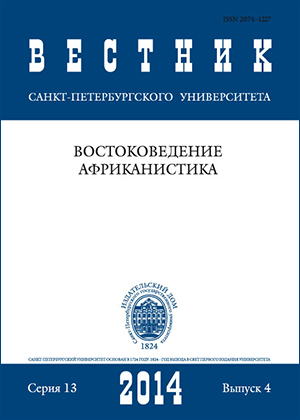Fraudulent marriage in the medieval Arabic Maqāma
Abstract
Collections of the Arabic Maqāmāt, especially those that were composed in the Late Middle Ages, have been little explored in the national and foreign Arabic studies. Introduction for the scientific use of previously unstudied maqamat texts allows us to consider the evolution of the Maqāma genre as a typological phenomenon from more objective point of view. As a result of such research it was found that several works, considerably distant from each other by dates of their creation, are based on a similar literary motif. As it shown in the article, there are different interpretations of this motif in Maqāma genre, which could be considered as reflections of respective changes in Arabic didactic literature and literary canon, which are inseparably connected with maqāma. The author conducts a comparative analysis of three works from the Maqāma genre and Shadow plays, written by al-Ḥarīrī (11th cent.), al-Mauṣilī (13th cent.), al-‘Abbās (16th cent.), which are based on the variation of the rare in the Arabic fine fiction motif — fraudulent marriage. Special feature of the article is a comparative analysis of the Late Medieval Maqāma and Shadow plays, which was not undertaken in national Arabic studies previously. Refs 11.
Keywords:
Arabic literature, maqāmāt, al-Ḥarīrī, al-Mauṣilī, al-‘Abbās
Downloads
References
Downloads
Published
How to Cite
Issue
Section
License
Articles of "Vestnik of Saint Petersburg University. Asian and African Studies" are open access distributed under the terms of the License Agreement with Saint Petersburg State University, which permits to the authors unrestricted distribution and self-archiving free of charge.





